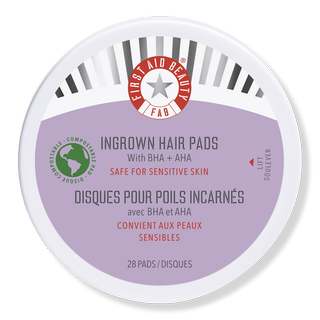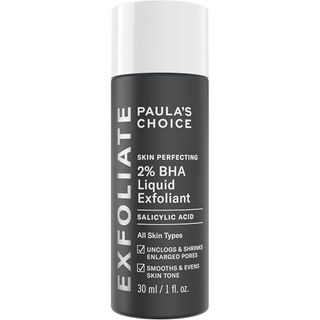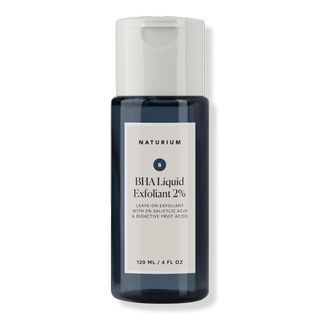As a 10-year veteran in the beauty space, creator Dash Lopez knows a thing or two about what gets people going on the internet. Five years ago, she started sharing her journey after making the decision to shave her head—a choice that completely impacted the trajectory of her brand. “I wanted to show up on socials in a way that wasn’t so traditional because I didn’t know how to show up in a traditional way,” Lopez tells Who What Wear. “Sometimes, you have creator dysmorphia, and you can’t really see yourself all the time because it just messes with you.”
She began to rethink the kind of content that felt true to her and also connective with her followers. This eventually led to the creation of her Instagram video series Fresh Cut Friday, where she goes through her full scalpcare routine after a fresh shave. Over time, the videos gained popularity, in addition to her other content, which has helped foster community and empower other bald women across the country. “The main thing that I’m trying to have everyone be on the same page about is living in their truth and owning their narratives, whether that’s by choice or not by choice, and that they’re still beautiful regardless.”
Below, learn all about her journey and how stepping into her power as a bald woman is challenging the beauty industry.
What first sparked the idea for you to shave your head? How would you describe the start of that journey?
The start of that journey was me wanting to connect with myself on a deeper level. I didn’t realize at the time that that’s what I was doing by cutting my hair. At first, it was a maintenance thing because I didn’t have to think about my hair tomorrow or the next day. It was so convenient, and it made me feel powerful, but I didn’t realize the magnitude of how powerful it was until I started meeting people in everyday life and talking about why I chose to make that decision.
Society has such a tethered relationship to hair and identity. What was that relationship for you like prior to making that decision?
The driving force was definitely feeling disconnected from the whole “good hair, bad hair” rhetoric. I grew up in a Dominican community. My mother and I are Afro-Latina, and we were in the salon every weekend watching the women in my family do their hair. I had a noticeably different hair texture than the rest of the women in my family, and I feel like they made me internalize this notion that because I had “good hair” I couldn’t possibly cut it or do anything to manipulate or tamper with it. In hindsight, I think that caused me to reject the idea that I wouldn’t be as beautiful without hair.
When you think of the way you empower other women in your position, do you find that there’s a cultural tie-in to that as well?
A thousand percent. I think about the cultural tie in the way that it’s even affected conversations around hair with women in my own family. My mother has opted to be a naturalista and no longer chemically relax her hair. I’ve had women, particularly women of color, open up about their experiences with alopecia, hair loss, and finding the right products for their hair texture, and many have come to the decision that they don’t have to or want to deal with it. Being able to step into that choice definitely shifted the conversation with women in my community about what it means to have good or bad hair culturally and how we can debunk that.
You know… You do something for yourself, and you see how it makes you feel. You sit with it, and that’s your journey. But when you open up the floor for other people to tell their stories and start aiming to amplify voices in a way you didn’t know you could, it really shifts your perspective—it becomes bigger than you. You realize that it’s not just about hair. It’s about finding purpose, beauty, and empowerment through other things. I always say it’s like when you lose one sense. Your other senses get stronger, and this community has shown me that. It may seem so frivolous at first, but when you have so many women reaching out to you about how you helped them feel empowered, that’s impact.
When someone makes the decision to shave their head, it’s often viewed and treated differently than when someone has lost their hair for a medical reason. Why do you think that is, and how do you believe you challenge those responses by showing up as your authentic self?
Whether it’s a choice or not, you’re still faced with how people perceive you. I think the main thing that I’m challenging is that we shouldn’t be perceiving anything. As kids, we’re taught to not make fun of people for their appearance, but when it comes to hair, I find that people are a lot more confident asking personal questions like “Do you have cancer?” or “Are you sick?” In reality, sick doesn’t have a look to it. You can deal with cancer, for example, and still have a full head of hair. These assumptions can be very hurtful and ignorant because it implies that someone can’t find beauty in ways that transcend societal expectations.
Someone can be bald by choice and feel empowered. On the other hand, someone can be bald and still be going through that process of trying to find themselves, but that’s a direct result of what society has taught them.
You’ll be attending Baldie Con later this year—what does having an event dedicated to bald women mean to you?
It’s such a long time coming, and Baldie Con is just one of the amazing events that the community is putting together. One of my favorite brands is Baldare Scalpcare, and they’re hosting a Baldie Brunch in September that I also hope to be a part of. I love to see a resurgence of all these things happening because we need community and support outside of a support group that can often be very dull, cold, and quiet. We deserve an environment where we get to dress up and feel feminine, and I think that’s what I love about these activations. They empower women to show up in ways that make them feel the most empowered and beautiful that don’t have to do with hair.
People question if cutting your hair isn’t somehow challenging your femininity, but I think that events like this further emphasize that doing so actually makes it stronger, and I love that Baldie Con gets to do that for us.
Your Fresh Cut Friday videos are a good reminder to the beauty industry that bald women are very much part of the conversation when it comes to finding hair and scalpcare products that deliver on quality. Do you find that people assume otherwise?
Absolutely, and the main comment I get from some people—even other bald people who have never had a routine in place—is, “Why are you doing all that? Just use alcohol, Vaseline, and call it a day.” I’m like, “Well, no.” I’m not a licensed esthetician, but if I’m taking a shower, shaving my body, and nourishing it afterward, I’m going to do the same thing for my scalp because it’s still skin. It felt like such a no-brainer for me, and when I started sharing, it kick-started that conversation that scalpcare is skincare.
It’s drawn insight from so many different people—bald girls and even the girlies with hair. They sit, and they watch, and they’re like, “Oh wow, I should be exfoliating my scalp because I experience buildup or flakiness.” Scalpcare is something everyone can benefit from, and I love that Fresh Cut Friday has highlighted that.
How has your beauty regimen evolved?
I’m someone who loves an experience after a shower, and my scalpcare routine has really become a spiritual practice and ritualistic. I’ve been doing this for five years, and I just started sharing it on socials. It feels powerful, but I’m also showing people what I’m doing and teaching them that this is something they can do too. Having a routine is going to provide you with nourishment to make you feel good, and I want people to know that they’ll feel calmer if they lean into that self-care.
What are some of your favorite products to use at the moment? What’s in your rotation?
I’m very consistent with a lot of what I’m using, but my all-time favorite scalpcare brand is Baldare Scalpcare. It was created by a bald woman for baldies. We don’t have a lot of scalpcare products out there, so the fact that she’s one of the few people really pioneering that is great. Briogeo is also one of the few brands that has an entire Scalp Revival line, and everyone can benefit from it, whether you have long hair or not.
The biggest concern that people ask me [about is] how I shave against the grain without breaking out, and aftercare is a big part of that. I think a lot of that has to do [with] the First Aid Beauty Ingrown Hair Pads. Naturium and Paula’s Choice also have BHA exfoliants that are so good for removing impurities from your pores too.
What’s one takeaway you would give to anyone who’s on a similar journey as you or is considering shaving their head?
I get a lot of comments that are like, “I wish I could do this and just put my hair back on.” … For everyone, even someone that may be struggling with the decision to do it because of a health matter, I would say it is probably the most powerful, impactful, and healthiest forms of detachment you’ll ever experience in your life. It’s something that will definitely transcend into other spaces and help you find empowerment in those spaces as well.
Shop Lopez’s Picks

First Aid Beauty
Ingrown Hair Pads

Paula’s Choice
Skin Perfecting 2% BHA Liquid Salicylic Acid Exfoliant

Naturium
BHA Liquid Exfoliant 2%
Explore More:

